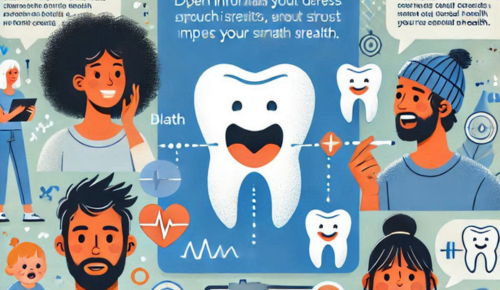
Stress has become part of our lives in today’s fast world, which affects various parts of our lives, from our physical and emotional health to our oral well-being. The connection between mental stress and physical health is commonly known, but it is important to know that the first sign or the earliest sign is generally seen in dental health.
When looking for professional help for stress-related dental problems, contact a professional cosmetic dentist in Chicago, IL, who understands your situation and provides you with customized treatment based on your lifestyle. Their expertise can help you maintain good oral health.
In this article, you will learn various ways in which stress impacts your oral health, identify common symptoms, understand the mechanism behind it, and learn about some practical solutions.
The Biological Connection Between Stress and Oral Health
Stress and oral health are interconnected and affect your body’s natural processes as they are caused by complex interactions between hormones, immune responses, and behavioral changes.
Chronic stress causes the release of cortisol and other stress hormones that suppress the immune system and increase inflammation in the body. These hormonal changes make the tissue of your mouth prone to infection and disease.
The body’s stress response reduces saliva production, which creates a dry environment in which harmful bacteria can thrive. This loss of protective mechanism increases the risk of different dental problems.
When people are stressed, they can engage in unconscious behavior like grinding their teeth or clenching their jaws, which puts pressure on their teeth and causes dental damage over time. This physical stress can also cause long-term oral health complications.
Stress also affects your eating habits, which can result in poor dietary choices that affect your overall health and dental health, too. Stress-induced change in nutrition affects the body’s ability to maintain healthy teeth and gums.
Common Oral Health Issues Linked to Stress
The effects of stress can be seen in our oral cavity and can range from simple inflammation to severe dental problems. It is important to identify these stress-related oral health issues early on so that you can prevent the problem from becoming severe.
Bruxism
Teeth grinding, commonly known as bruxism, when caused by high stress, can be intense and affects enamel, tooth sensitivity, and jaw pain. This unconscious habit can cause a lot of damage to dental work and the natural structure of your teeth.
Temporomandibular joint (TMJ)
This is a disorder that can either develop or get worse when the patient is stressed, leading to jaw pain, headaches, and difficulty in normal mouth movements. The constant tension of facial muscles can cause chronic discomfort. TMJ disorder can be managed and requires professional treatment to be cured.
Gum Disease
Stress can also cause gum disease as it weakens the immune system and affects oral hygiene habits. The combination of neglected oral hygiene and weak immunity makes the best condition for periodontal problems.
Cold Sores
Canker sores and cold sores are common during stressful times and can be painful and interfere with day-to-day activities. Such painful conditions can make things worse when you are already stressed.
Preventive Measures and Management Strategies
It is important to take action to protect your oral health in stressful times so that you can reduce the probability of developing a serious dental issue. Stress management with proper dental care can give you the best defense against stress-related oral health issues.
Stress Management with Meditation
There are some effective stress reduction techniques that help you lower your stress level by following some simple steps. These include meditation, deep breathing, or regular exercise. All of these help reduce the physical effect of stress on oral health by keeping your stress level in check.
Oral Hygiene
It becomes important to stick to regular dental hygiene practices as much as possible, especially when there is a lot of pressure and you start neglecting yourself. Daily brushing and flossing and biannual visits to the dental hygienist offset the effects of stress on dental health.
Oral Devices
Night guards can be worn as protective devices to reduce the wear and tear that comes with stress-induced teeth grinding and jaw clenching. Professional-grade mouthguards are important to protect your teeth during sleep.
Take Action for Your Oral Health
Stress can be very dangerous to your health, especially to your teeth, so do not let it control you. Make an appointment for a complete dental checkup with a trusted dentist in order to save your smile and keep it healthy in the future.












